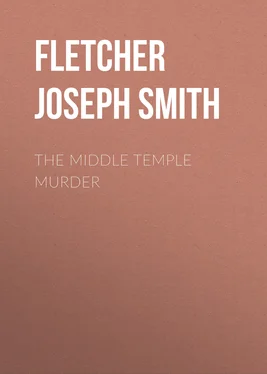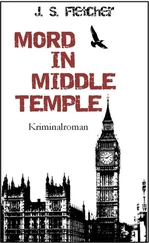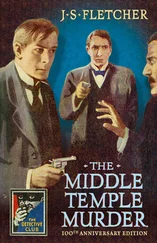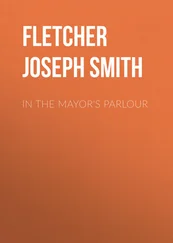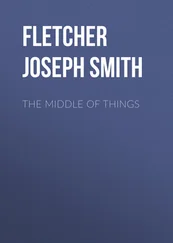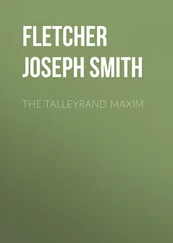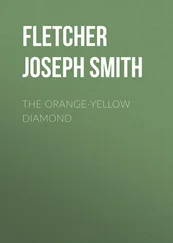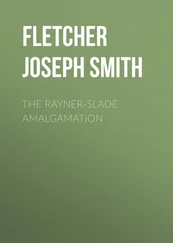Joseph Fletcher - The Middle Temple Murder
Здесь есть возможность читать онлайн «Joseph Fletcher - The Middle Temple Murder» — ознакомительный отрывок электронной книги совершенно бесплатно, а после прочтения отрывка купить полную версию. В некоторых случаях можно слушать аудио, скачать через торрент в формате fb2 и присутствует краткое содержание. Жанр: foreign_prose, Классический детектив, foreign_detective, foreign_antique, на английском языке. Описание произведения, (предисловие) а так же отзывы посетителей доступны на портале библиотеки ЛибКат.
- Название:The Middle Temple Murder
- Автор:
- Жанр:
- Год:неизвестен
- ISBN:нет данных
- Рейтинг книги:5 / 5. Голосов: 1
-
Избранное:Добавить в избранное
- Отзывы:
-
Ваша оценка:
- 100
- 1
- 2
- 3
- 4
- 5
The Middle Temple Murder: краткое содержание, описание и аннотация
Предлагаем к чтению аннотацию, описание, краткое содержание или предисловие (зависит от того, что написал сам автор книги «The Middle Temple Murder»). Если вы не нашли необходимую информацию о книге — напишите в комментариях, мы постараемся отыскать её.
The Middle Temple Murder — читать онлайн ознакомительный отрывок
Ниже представлен текст книги, разбитый по страницам. Система сохранения места последней прочитанной страницы, позволяет с удобством читать онлайн бесплатно книгу «The Middle Temple Murder», без необходимости каждый раз заново искать на чём Вы остановились. Поставьте закладку, и сможете в любой момент перейти на страницу, на которой закончили чтение.
Интервал:
Закладка:
J. S. Fletcher
The Middle Temple Murder
CHAPTER ONE
As a rule, Spargo left the Watchman office at two o'clock. The paper had then gone to press. There was nothing for him, recently promoted to a sub-editorship, to do after he had passed the column for which he was responsible; as a matter of fact he could have gone home before the machines began their clatter. But he generally hung about, trifling, until two o'clock came. On this occasion, the morning of the 22nd of June, 1912, he stopped longer than usual, chatting with Hacket, who had charge of the foreign news, and who began telling him about a telegram which had just come through from Durazzo. What Hacket had to tell was interesting: Spargo lingered to hear all about it, and to discuss it. Altogether it was well beyond half-past two when he went out of the office, unconsciously puffing away from him as he reached the threshold the last breath of the atmosphere in which he had spent his midnight. In Fleet Street the air was fresh, almost to sweetness, and the first grey of the coming dawn was breaking faintly around the high silence of St. Paul's.
Spargo lived in Bloomsbury, on the west side of Russell Square. Every night and every morning he walked to and from the Watchman office by the same route—Southampton Row, Kingsway, the Strand, Fleet Street. He came to know several faces, especially amongst the police; he formed the habit of exchanging greetings with various officers whom he encountered at regular points as he went slowly homewards, smoking his pipe. And on this morning, as he drew near to Middle Temple Lane, he saw a policeman whom he knew, one Driscoll, standing at the entrance, looking about him. Further away another policeman appeared, sauntering. Driscoll raised an arm and signalled; then, turning, he saw Spargo. He moved a step or two towards him. Spargo saw news in his face.
"What is it?" asked Spargo.
Driscoll jerked a thumb over his shoulder, towards the partly open door of the lane. Within, Spargo saw a man hastily donning a waistcoat and jacket.
"He says," answered Driscoll, "him, there—the porter—that there's a man lying in one of them entries down the lane, and he thinks he's dead. Likewise, he thinks he's murdered."
Spargo echoed the word.
"But what makes him think that?" he asked, peeping with curiosity beyond Driscoll's burly form. "Why?"
"He says there's blood about him," answered Driscoll. He turned and glanced at the oncoming constable, and then turned again to Spargo. "You're a newspaper man, sir?" he suggested.
"I am," replied Spargo.
"You'd better walk down with us," said Driscoll, with a grin. "There'll be something to write pieces in the paper about. At least, there may be." Spargo made no answer. He continued to look down the lane, wondering what secret it held, until the other policeman came up. At the same moment the porter, now fully clothed, came out.
"Come on!" he said shortly. "I'll show you."
Driscoll murmured a word or two to the newly-arrived constable, and then turned to the porter.
"How came you to find him, then?" he asked The porter jerked his head at the door which they were leaving.
"I heard that door slam," he replied, irritably, as if the fact which he mentioned caused him offence. "I know I did! So I got up to look around. Then—well, I saw that!"
He raised a hand, pointing down the lane. The three men followed his outstretched finger. And Spargo then saw a man's foot, booted, grey-socked, protruding from an entry on the left hand.
"Sticking out there, just as you see it now," said the porter. "I ain't touched it. And so—"
He paused and made a grimace as if at the memory of some unpleasant thing. Driscoll nodded comprehendingly.
"And so you went along and looked?" he suggested. "Just so—just to see who it belonged to, as it might be."
"Just to see—what there was to see," agreed the porter. "Then I saw there was blood. And then—well, I made up the lane to tell one of you chaps."
"Best thing you could have done," said Driscoll. "Well, now then—"
The little procession came to a halt at the entry. The entry was a cold and formal thing of itself; not a nice place to lie dead in, having glazed white tiles for its walls and concrete for its flooring; something about its appearance in that grey morning air suggested to Spargo the idea of a mortuary. And that the man whose foot projected over the step was dead he had no doubt: the limpness of his pose certified to it.
For a moment none of the four men moved or spoke. The two policemen unconsciously stuck their thumbs in their belts and made play with their fingers; the porter rubbed his chin thoughtfully—Spargo remembered afterwards the rasping sound of this action; he himself put his hands in his pockets and began to jingle his money and his keys. Each man had his own thoughts as he contemplated the piece of human wreckage which lay before him.
"You'll notice," suddenly observed Driscoll, speaking in a hushed voice, "You'll notice that he's lying there in a queer way—same as if—as if he'd been put there. Sort of propped up against that wall, at first, and had slid down, like."
Spargo was taking in all the details with a professional eye. He saw at his feet the body of an elderly man; the face was turned away from him, crushed in against the glaze of the wall, but he judged the man to be elderly because of grey hair and whitening whisker; it was clothed in a good, well-made suit of grey check cloth—tweed—and the boots were good: so, too, was the linen cuff which projected from the sleeve that hung so limply. One leg was half doubled under the body; the other was stretched straight out across the threshold; the trunk was twisted to the wall. Over the white glaze of the tiles against which it and the shoulder towards which it had sunk were crushed there were gouts and stains of blood. And Driscoll, taking a hand out of his belt, pointed a finger at them.
"Seems to me," he said, slowly, "seems to me as how he's been struck down from behind as he came out of here. That blood's from his nose—gushed out as he fell. What do you say, Jim?" The other policeman coughed.
"Better get the inspector here," he said. "And the doctor and the ambulance. Dead—ain't he?"
Driscoll bent down and put a thumb on the hand which lay on the pavement.
"As ever they make 'em," he remarked laconically. "And stiff, too.
Well, hurry up, Jim!"
Spargo waited until the inspector arrived; waited until the hand-ambulance came. More policemen came with it; they moved the body for transference to the mortuary, and Spargo then saw the dead man's face. He looked long and steadily at it while the police arranged the limbs, wondering all the time who it was that he gazed at, how he came to that end, what was the object of his murderer, and many other things. There was some professionalism in Spargo's curiosity, but there was also a natural dislike that a fellow-being should have been so unceremoniously smitten out of the world.
There was nothing very remarkable about the dead man's face. It was that of a man of apparently sixty to sixty-five years of age; plain, even homely of feature, clean-shaven, except for a fringe of white whisker, trimmed, after an old-fashioned pattern, between the ear and the point of the jaw. The only remarkable thing about it was that it was much lined and seamed; the wrinkles were many and deep around the corners of the lips and the angles of the eyes; this man, you would have said to yourself, has led a hard life and weathered storm, mental as well as physical.
Driscoll nudged Spargo with a turn of his elbow. He gave him a wink.
"Better come down to the dead-house," he muttered confidentially.
Читать дальшеИнтервал:
Закладка:
Похожие книги на «The Middle Temple Murder»
Представляем Вашему вниманию похожие книги на «The Middle Temple Murder» списком для выбора. Мы отобрали схожую по названию и смыслу литературу в надежде предоставить читателям больше вариантов отыскать новые, интересные, ещё непрочитанные произведения.
Обсуждение, отзывы о книге «The Middle Temple Murder» и просто собственные мнения читателей. Оставьте ваши комментарии, напишите, что Вы думаете о произведении, его смысле или главных героях. Укажите что конкретно понравилось, а что нет, и почему Вы так считаете.
